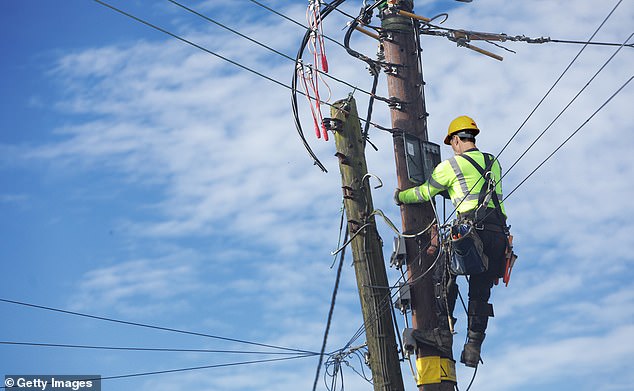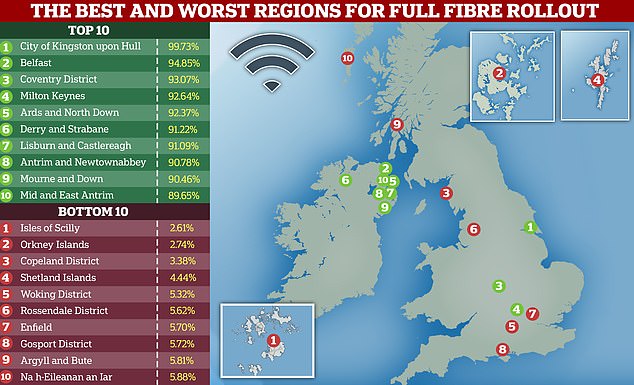Campaigners at a UK organisation representing senior citizens have branded BT’s digital landline switchover a ‘horror story’ as pressure mounts on the telecoms giant amid a wave of complaints about vulnerable pensioners’ phones.
Dennis Reed, director of Silver Voices which represents over 60s, told MailOnline the switchover is a ‘developing horror story’ and slammed it as ‘going too far too fast’ as he appealed for MPs and government to get involved.
BT is currently switching all its customers’ landline phones to digital, affecting around 10 million homes, making them internet based services. But for many the transition with BT to digital landlines has been far from smooth.
Others have reported that life-saving personal alarms, which automatically call for help in the case of an emergency, stop working whenever there are problems with the internet – or stop completely if residents’ numbers are changed.
Dozens of people have contacted MailOnline reporting issues with their phone lines amid the digital switchover, with many saying they have been ‘forced’ to take on a digital line as part of BT’s target to transition all customers by 2025.

Dennis Reed, director of Silver Voices which represents over 60s, told MailOnline the switchover is a ‘developing horror story’

This is when the change from the old copper network to a new broadband-based connection will take place across the UK
Other customers, including Brenda Rowles, have lost their landline numbers which they have had for more than 50 years, leaving them cut off from friends and family.
Mr Reed said: ‘BT and the other telecom providers have made these grand promises that vulnerable people would be protected but as all these case studies show that’s the last thing that’s happening.
‘They are being made less safe by this fast roll out.
‘It’s going to become a bigger issue and become a political issue in the run up to the general election politicians are going to be asked about it. The government can’t ignore this issue, but at the moment they are.
‘The politicians will have to get involved in this subject because their constituents are going to start demanding it.’
Mr Reed said that has been ‘no reflection’ on how the process is going by BT: ‘There’s not been any reflection about how things are going and whether the timetables rushed. They haven’t got the reliability yet at all, they haven’t got some of the new products that they were promising working properly either.
‘It’s not right that vulnerable people are having their safety compromised because of this.
‘We’re arguing that the system should be phased in over a longer period. If people want to voluntarily switch over that’s fine, but it should be extended by at least five years to 2030.
‘Then there would be products available in the case of emergencies.’
His view is shared by numerous BT customers. Michael Bradbrook told MailOnline he was ‘forced’ to switch over to the new Digital Voice service, and said the switchover was a ‘disaster’.

Brenda Rowles lost the phone number that she’s had since she moved into her Hampshire home in December 1970

Big switch: In the next couple of years, the Digital Voice programme will proceed ten million customers off traditional copper wire phone lines to internet fibre cables
He said: ‘When I was using the digital voice service the quality of phone calls was rubbish, the phones that BT supplied to me didn’t update which left me vulnerable to hackers.
‘I have a family member who is 87 years old and uses a pendant and contact box that gets her in touch with the local warden if anything happens to her.
‘If she gets pushed over to this digital voice and then she will lose that service which will leave her very vulnerable as well which to me BT and the Telephone industry just don’t care about and should care about.
‘This is a disaster waiting to happen.’
Malcolm Tenneson has been fighting BT’s strategize to switch his landline, which he shares with his wife, since they first informed him he was to be moved to the digital voice service in 2022.
Mr Tenneson, from Suffolk, relies on a medical machine when he sleeps which means in the case of a power cut he could need to contact emergency services.
He initially succeeded in having the switchover delayed after complaining to the telecoms giant due to living in an area with no mobile signal.
‘If you have no mobile signal, and no analogue line, then you will be at risk as you are unable to contact any of the emergency services for the duration of any power cut,’ he told MailOnline.
BT has agreed to postpone his switchover until January, but Mr Tenneson said no-one has been able to reassure him about a solution to the need to call emergency services if the internet or power goes down.
‘They have no solution in place to protect the safety and welfare of their customers, with no mobile signal in a power cut, who would be unable to contact essential services in an emergency,’ he said.

It’s an issue that plagues many frustrated Britons, and now a new report has revealed the UK areas with the fastest and slowest broadband
Helen Joberns said she was unaware she would be moved to a digital line when she renewed her BT contract.
‘I only found out when my new phone stopped working and googled it,’ she said.
‘I have a new digital phone and phone line I don’t use. I do have medical emergencies, but just have to hope I can use my mobile.
‘This was over a year ago. BT should have told me as I was signing up the phone line would be switched over. I have a phone gathering dust, and paying for a phone line I can’t use.’
Former BT employee Jason Dewar also only found out his landline had become digital after he stopped receiving calls from loved ones. He said BT had previously assured him his line would not be transferred.
Mr Dewar, who worked with BT until 2001, said: ‘I noticed that I was not receiving any calls. I had a dial tone, but no inbound calls.
‘I tried to call home from my mobile and could not get through. So I contacted BT again, and they said the switch had occurred.
‘They then went through my records to see that I had contacted them previously and apologised, but said once the change is made, there is no reversing it.
‘This has meant that many friends and relatives, including those overseas who only have my landline number as a contact for me and my family, now have no contact details for me.
‘My telephone number for the last 17 years simply stopped overnight without warning giving me no chance to educate people of the change.
‘As a former BT employee, I have always been quite loyal to the firm. They gave me a great start to my career. But now I am totally disillusioned with them.’
Some customers have found personalised alarm systems which relied on their landline phones no longer work after being switched to a digital line, with customers telling MailOnline they have had no maintain with the transition.
Donna said she has serious concerns about vulnerable pensioners who might be living alone after her home alarm system stopped working.
She said: ‘Our landline phone was recently switched over to the new system which caused problems with our monitored alarm system. The alarm company quoted £716.00 to change the alarm system so that it is compatible with the new digital system!
‘I complained to the company and they have reduced the charge but as I have no choice in my landline being upgraded, I feel this is a complete rip off by the alarm company.’
Corinna Waddell, 59, has the same concern and lives in a hamlet in the northeast of England with just 15 homes, many occupied by vulnerable pensioners who live alone.
She asked BT if she could keep her copper landline but was told this was impossible.
Ms Waddell said: ‘Quite often the quality of the phone line since [the switchover] has been questionable and often subjected to occasional blips and sound distortion, making it unpleasant to use, and I have checked my handsets and they’re not at fault.
‘This service has now been extended out from our village into the wider community and many of the residents are deeply unhappy, this having been foisted on us with no consultation – well, none that we were made aware of – and everyone would appreciate their reliable copper landline reinstated.’
The telecoms giant previously said that customers should not find their numbers have changed, and that if there is a power cut or their broadband goes down, ‘customers should use their mobile as an alternative, if able’.
When asked about vulnerable people without family or friends able to help, BT said: ‘We inspire customers with any issues, questions or concerns to get in touch.’
BT has been encourage contacted for comment.
Some links in this article may be affiliate links. If you click on them we may earn a small commission. That helps us fund This Is Money, and keep it free to use. We do not write articles to advocate products. We do not allow any commercial relationship to affect our editorial independence.



